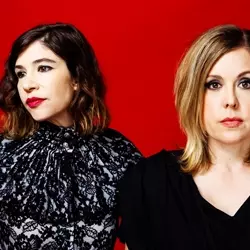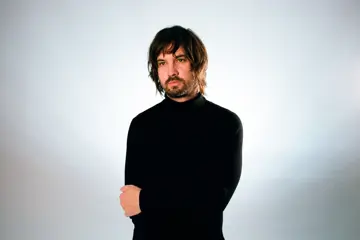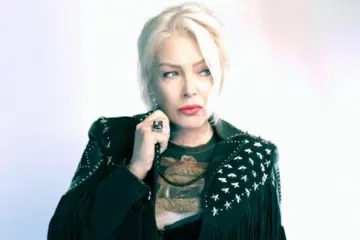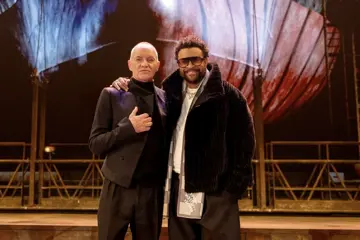 Sleater-Kinney
Sleater-KinneySleater-Kinney play The Zoo on Wednesday.
In 1999, an American magazine asked Sleater-Kinney frontwoman Carrie Brownstein what she’s like to see more of in her band. “More pretty melodies and simple pop songs!” she said. Fast forward three years, and the answer is just as facile. “Oh man,” answers Brownstein, laughing. “I think in 2002 I’d like more… drum solos!”
It's been a busy year for America's original Riot Grrrls. The band are just about to embark on their second Australian tour (their first with drummer Janet Weiss, who joined in 1997), but it's the release of their sixth album - One Beat - that's kept them on their toes. Or rather, the circumstances leading up to it - because, for the first time since forming in 1994 - Sleater-Kinney decided to take a break from each other between records. A real break. Guitarist and songwriter Corin Tucker, for example, became a mother. Weiss toured and recorded with her side project, Quasi. And front woman Carrie Brownstein realised - possibly for the first time - that even if your band is your reason for being, then it's still "nice to go out and actually live your life and experience things". As she says down the phone from her home in Portland, time away from the thing you love (in her case, done by appearing in the independent flick Group and working as a substitute teacher) also helps you gain ‘perspective’.
"Taking time away from the band helped us realise what was important about the band," she says earnestly. "How unique the chemistry is between the three of us, how important it is for us to have a creative outlet and to have music and have Sleater-Kinney to be a part of our lives - for no other reason than because we love it. The impetus why we're playing and the reason why we've played became so interesting again! It became about, 'only for ourselves'; it's quite important to remember why you're doing it and how it has to be for your own personal enjoyment and not be for someone else."
It's an ethos that partly mirrors the reasons behind why Sleater-Kinney formed in the mid-90s in the first place. Then, they were part of the burgeoning riot grrrl scene in Olympia (where they were originally based), which centred around feminist and gay issues. These days they're not so stoically politically minded, but even though "one's perspective changes as you get older", Brownstein's original 'do it because you enjoy it' mantra still rings true.
Don't miss a beat with our FREE daily newsletter
"You try and incorporate a broader political analysis and one that encompasses a lot of other issues that don't pertain to yourself (as you get older)," she reasons. "So, I still concern myself with feminist and women's issues, and queer issues are still something I think about in addition to what's going on in the world today. I think we're all really multi-dimensional people and these are all facets that we have - it doesn't always necessarily come across in our music. Our activism and our politics are not always part of our music - our art is sometimes separate from that."
The end result from all this is, of course, One Beat - an album that saw Sleater-Kinney sit down beforehand and decide that they "really needed to take a risk... we really wanted to take a risk, do something different...". Whether or not having five albums come before made things easier, though, is another matter.
"It is challenging," muses Brownstein. "If you have 65 songs out in the world - to write something that doesn't sound like something you've already done, you know? That is hard!"
But still, having spent time apart now, Sleater-Kinney can see what is and isn't important to them, and - as Brownstein so rightly points out - "If you make a record, have a tour, then write another record... what are you going to write about?". Even with 65 songs floating around the sonic stratosphere, a new outlook has made the process "more dynamic" and "the landscape of the album more vast."
"I think when you take time away you do remember what's vital about it," Brownstein concludes. "And I sorely missed having a musical outlet. I mean, music has always been so important in my life, and when I didn't have it I really noticed it, I felt a loss. So I think it's important to know it's crucial in your life, and if you've lost sight of that then I think that's when you need to take a break. I think we also retain vitality by challenging each other musically and trying to push ourselves to come up with new ideas and to have fun - remembering what we do is fun and we're lucky to be doing it."
















